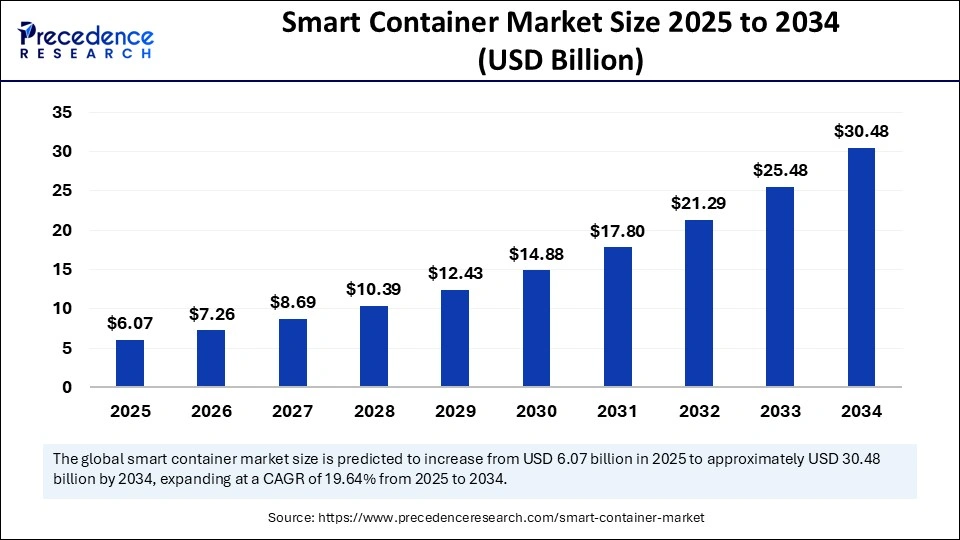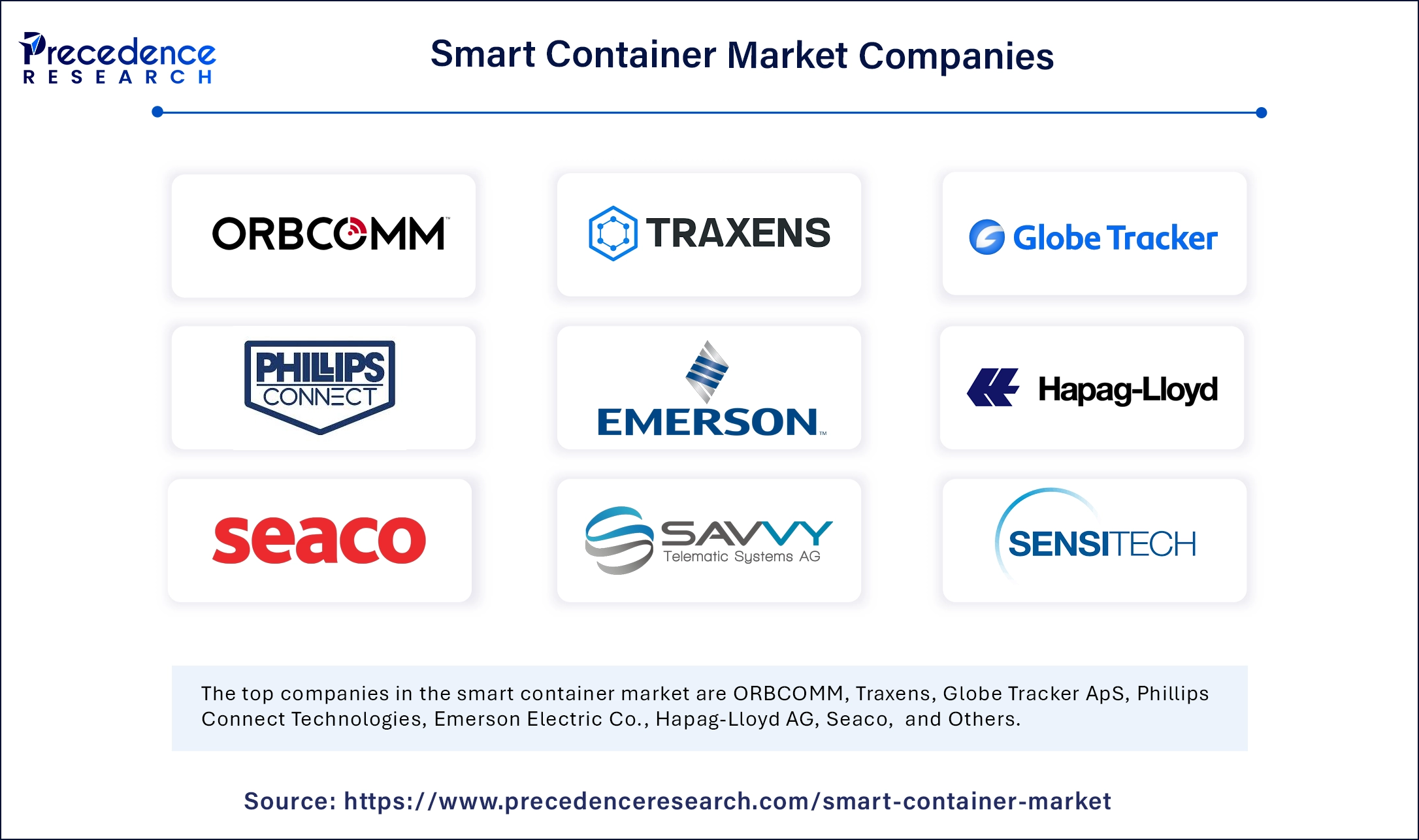The global smart container market size is estimated to surge around USD 30.48 billion by 2034 increasing from USD 5.07 billion in 2024, with a CAGR of 19.64%.

Smart Container Market Key Highlights
-
North America dominated the global market with the largest market share of 36% in 2024.
-
Asia Pacific is expected to witness the fastest CAGR of 20.64% during the forecast period.
-
By offering, the hardware segment contributed the biggest market share of 42% in 2024.
-
The software segment is projected to expand at the fastest CAGR during the forecast period.
-
By technology, the GPS segment accounted for the largest market share of 37% in 2024.
-
The LoRa WAN segment is anticipated to expand at the highest CAGR during the projection period.
-
By application, the asset tracking and management segment contributed the highest market share of 37% in 2024.
-
The supply chain optimization segment is expected to grow at the fastest CAGR between 2025 and 2034.
-
By end-use, the food & beverages segment held the major market share of 34% in 2024.
-
The pharmaceuticals segment is projected to grow rapidly in the coming years.
Smart Containers: Enhancing Efficiency in Logistics and Supply Chain
Smart containers are shipping containers equipped with advanced sensors and IoT technology that monitor and transmit real-time data on location, temperature, humidity, and security status. These containers enable businesses to track their cargo more accurately throughout the supply chain, ensuring better control over shipment conditions and reducing the risk of damage or loss.
By providing insights through data analytics, smart containers help optimize routes, improve inventory management, and enhance overall operational efficiency. They are increasingly used in industries like pharmaceuticals, food, and electronics, where maintaining specific environmental conditions is critical for product quality and safety.
How Does AI Impact the Smart Container Market?
Artificial Intelligence (AI) significantly enhances the Smart Container market by enabling real-time monitoring and intelligent management of container conditions during transportation. AI-powered sensors collect data on temperature, humidity, location, and container integrity, which AI systems analyze to ensure optimal conditions for sensitive cargo. This helps in reducing spoilage, improving supply chain transparency, and enabling proactive maintenance by predicting potential issues before they occur.
Moreover, AI facilitates advanced route optimization and dynamic decision-making by processing vast amounts of logistical data. It allows operators to respond swiftly to delays, reroute shipments, and improve overall efficiency. By automating container tracking and condition management, AI reduces operational costs and enhances reliability, making smart containers a critical component of modern, intelligent logistics networks.
Market Overview: Revolutionizing Supply Chain and Logistics with Smart Containers
The Smart Container market is transforming global logistics and supply chain management by integrating advanced digital technologies into traditional shipping containers. Smart containers are equipped with IoT sensors, GPS tracking, RFID tags, temperature and humidity monitors, and real-time data communication capabilities. These innovations enable end-to-end visibility, enhanced security, and optimized management of cargo during transit, whether by sea, land, or air.
With increasing globalization, e-commerce growth, and the demand for cold chain logistics for perishable goods like pharmaceuticals and food, smart containers have become crucial for ensuring product integrity, reducing theft, and minimizing operational inefficiencies. As supply chains become more complex and stakeholders demand transparency and real-time data, smart containers offer a powerful solution that integrates seamlessly with cloud platforms, AI analytics, and blockchain for secure and automated documentation.
Smart Container Market Growth Factors
The growth of the smart container market is being driven by rapid advancements in IoT, sensor technologies, and communication networks such as 5G and satellite connectivity. These technologies enhance container tracking accuracy and enable real-time monitoring of various environmental conditions inside containers, critical for sensitive cargo. Moreover, the continuous rise in global trade volume, fueled by expanding international commerce and booming e-commerce sectors, necessitates smarter logistics solutions to maintain efficient and secure cargo handling.
Regulatory pressures regarding cargo safety, environmental compliance, and the reduction of supply chain losses further accelerate smart container adoption. Additionally, the growing preference for digitalization and automation in logistics operations is encouraging stakeholders to invest in smart container technologies to enhance operational agility and cost efficiency.
Market Scope
| Report Coverage | Details |
| Market Size by 2034 | USD 30.48 Billion |
| Market Size in 2025 | USD 6.07 Billion |
| Market Size in 2024 | USD 5.07 Billion |
| Market Growth Rate from 2025 to 2034 | CAGR of 19.64% |
| Dominating Region | North America |
| Fastest Growing Region | Asia Pacific |
| Base Year | 2024 |
| Forecast Period | 2025 to 2034 |
| Segments Covered | Offering, Technology, Application, End-Use and Region |
| Regions Covered | North America, Europe, Asia-Pacific, Latin America, and Middle East & Africa |
Market Dynamics
Key Market Drivers: Enhanced Visibility, Security, and Regulatory Compliance
One of the most compelling drivers for the smart container market is the growing need for enhanced visibility and transparency in supply chains. Smart containers provide real-time data that allow shippers, logistics providers, and end customers to track shipments accurately and monitor cargo conditions to prevent spoilage or damage. Security concerns, such as theft and tampering, are addressed through sensors that detect unauthorized access and trigger instant alerts.
Compliance with stringent regulations on food safety, pharmaceutical handling, and environmental standards also motivates adoption. For instance, cold chain logistics demand strict temperature control and traceability, which smart containers effectively support. Furthermore, increasing pressure to reduce carbon footprints and optimize route planning through real-time data insights drives investment in smart container solutions.
Opportunities: Integration with Emerging Technologies and Expanding Cold Chain Logistics
The smart container market offers expansive opportunities as it increasingly integrates with cutting-edge technologies such as artificial intelligence, blockchain, and cloud computing. AI enables predictive analytics for supply chain optimization, while blockchain ensures secure and immutable documentation and provenance tracking, reducing fraud and disputes. The rising demand for cold chain logistics, particularly for pharmaceuticals, vaccines, and fresh food products, presents a significant growth avenue. As countries implement stricter health and safety regulations, the need for smart containers capable of ensuring cold chain integrity grows substantially.
Additionally, the surge in e-commerce and direct-to-consumer delivery models fuels demand for efficient last-mile tracking solutions integrated with smart containers. Partnerships between container manufacturers, IoT providers, and logistics companies are fostering innovative solutions tailored to diverse industry needs, creating a fertile environment for market expansion.
Challenges: High Implementation Costs and Connectivity Issues
Despite promising growth prospects, the smart container market faces several challenges. The initial investment cost for equipping containers with advanced sensors, communication modules, and integrated software platforms can be prohibitive, particularly for small and medium-sized enterprises. Ensuring reliable connectivity across remote and maritime routes remains a technical hurdle, especially in regions with limited satellite or cellular network coverage.
Data privacy and cybersecurity concerns also emerge as large volumes of sensitive shipment data are transmitted and stored digitally, requiring robust protection measures. Moreover, the fragmented nature of the global logistics industry and the lack of standardized protocols for data sharing and system interoperability complicate large-scale adoption. Training and change management within supply chain organizations further slow the transition to smart container technologies.
Regional Outlook: Asia-Pacific Leads Growth, North America and Europe Drive Innovation
The Asia-Pacific region is poised to lead the smart container market’s growth, fueled by its position as a global manufacturing and export hub and increasing investments in smart port infrastructure and logistics digitization. Countries like China, India, Japan, and South Korea are aggressively adopting IoT technologies and expanding their cold chain networks, which propels smart container deployment. North America remains a significant market driven by strong technological innovation, a mature logistics sector, and stringent regulatory frameworks that promote traceability and security.
The United States and Canada are key players in integrating smart container solutions within their extensive supply chains. Europe holds substantial market share due to its focus on sustainable logistics, advanced port facilities, and robust regulatory environment. The region’s emphasis on green logistics and reducing supply chain inefficiencies complements the adoption of smart containers. Latin America and the Middle East & Africa are emerging markets where infrastructural developments and growing trade activities offer potential for future expansion.
Get the Sample Copy of Report@ https://www.precedenceresearch.com/sample/5994
Smart Container Market Companies

- ORBCOMM
- Traxens
- Globe Tracker ApS
- Phillips Connect Technologies
- Emerson Electric Co.
- Hapag-Lloyd AG
- Seaco
- Savvy Telematics
- Sensitech Inc.
- Robert Bosch GmbH
- A.P. Moller – Maersk
- Roambee Corporation
- Nexxiot
Segments Covered in the Report
By Offering
- Hardware
- Software
- Services
By Technology
- Introduction
- Global Positioning System (GPS)
- Cellular
- LoRa Wan (Long Range Wide Area Network)
- Bluetooth Low Energy (BLE)
By Application
- Asset Tracking & Management
- Supply Chain Optimization
- Safety & Security
- Others
By End-Use
- Food & Beverages
- Pharmaceuticals
- Oil & Gas
- Chemicals
- Others
By Region
- North America
- Europe
- Asia Pacific
- Middle East & Africa
- Latin America
Also Read: Smart Oil Dipstick Market
Source: https://www.precedenceresearch.com/smart-container-market
